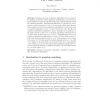Free Online Productivity Tools
i2Speak
i2Symbol
i2OCR
iTex2Img
iWeb2Print
iWeb2Shot
i2Type
iPdf2Split
iPdf2Merge
i2Bopomofo
i2Arabic
i2Style
i2Image
i2PDF
iLatex2Rtf
Sci2ools
115
click to vote
ISAAC
2005
Springer
2005
Springer
The Phase Matrix
Reducing the error of quantum algorithms is often achieved by applying a primitive called amplitude amplification. Its use leads in many instances to quantum algorithms that are quadratically faster than any classical algorithm. Amplitude amplification is controlled by choosing two complex numbers φs and φt of unit norm, called phase factors. If the phases are well-chosen, amplitude amplification reduces the error of quantum algorithms, if not, it may increase the error. We give an analysis of amplitude amplification with a emphasis on the influence of the phase factors on the error of quantum algorithms. We introduce a so-called phase matrix and use it to give a straightforward and novel analysis of amplitude amplification processes. We show that we may always pick identical phase factors φs = φt with argument in the range π 3 ≤ arg(φs) ≤ π. We also show that identical phase factors φs = φt with −π 2 < arg(φs) < π 2 never leads to an increase in the error...
Related Content
| Added | 27 Jun 2010 |
| Updated | 27 Jun 2010 |
| Type | Conference |
| Year | 2005 |
| Where | ISAAC |
| Authors | Peter Høyer |
Comments (0)

